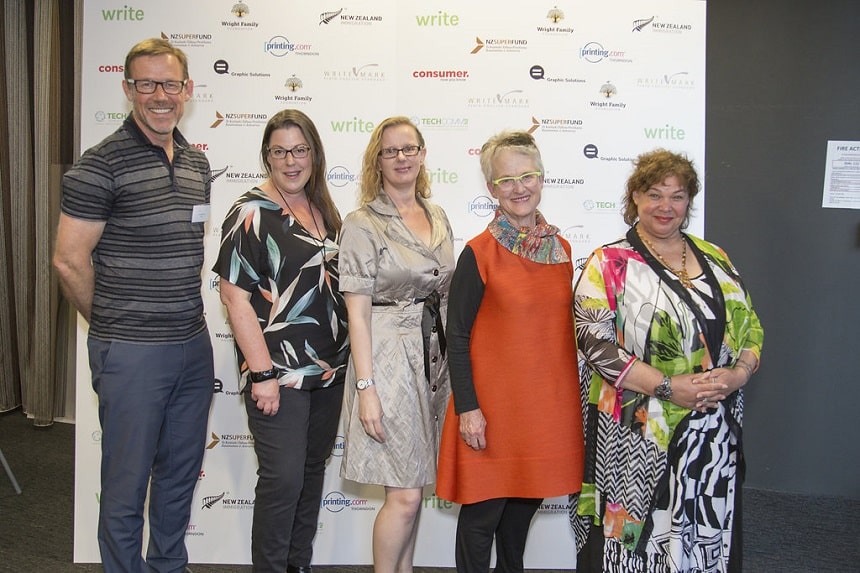
We were lucky enough to have five judges make last year's Awards ceremony. From left are Simon Hertnon, Kylie McGrath, Rachael Fogarty, Rachel McApline, and Maryland Spencer. Image by A Beautiful Photo
Meet our incredible line-up of plain English experts — from around New Zealand and the world — who’ll be judging entries in this year’s Awards. We’re proud to have such a wonderful pool of experts, and honoured that they’ve all offered their time to help us decide on our finalists and winners. We’re also grateful for the feedback they’ll give to all shortlisted entrants.
Judges for the 2018 Plain English Awards
Melissa Mebus September 3rd, 2018
Posted In: 2018 Plain English Awards, Communications, Judges, People's Choice awards, Plain English Awards
Tags: 2018 Plain English Awards, champions, clear communication, People's Choice, Plain English Awards

Learn tips from the experts on how to win. Photo by Ray Hennessy on Unsplash
On Friday, 4 May we’ll be celebrating entries opening for this year’s Awards with a free lunchtime seminar at Write Limited in Wellington.
Hear how to be a winner from the experts
We’ve gathered together a panel of experts to give you tips on how to submit a winning entry. You’ll get expert advice from past winners, judges, and supporters of the Awards, upping your chances of a successful entry.
During the seminar our panel will explain:
- what judges look for in a winning entry
- what’s involved in submitting an entry
- what winning an Award means for an individual or organisation
- why every entry plays an important part in helping everyday New Zealanders.
Book your tickets now
You’ll have plenty of time to ask questions. Bring your own lunch — we’ll supply coffee, tea, juice, and fruit.
Places are limited so book your tickets now. Entry by koha.
Melissa Mebus April 11th, 2018
Posted In: 2018 Plain English Awards, Plain English Awards, Social good, Trophy Tips Seminar
Tags: 2018 Plain English Awards, Plain English Awards, Trophy Tips Seminar, Turnaround Award

Everyone wins with a sound sponsorship agreement. Photo by Shirly Niv Marton / Unsplash
Sponsorship isn’t about giving away money to a good cause: that’s donating. Sponsorship offers two parties the opportunity to be part of a win–win agreement.
In return for their support, sponsors get the same feel-good factor they would get from donating. But on top of that, they also get a return on the investment in their chosen cause. So, true sponsorship offers an organisation something sustainable and tangible in return for its commitment.
Sponsors get clear returns on their investment
Sponsoring the Plain English Awards offers clear returns on your investment, such as:
- alignment with plain English values. You’re seen as customer-focused, transparent, and trustworthy
- brand exposure. Forget about advertising! You’ll be widely promoted in our Awards publicity, reaching large groups of potential new customers
- networking opportunities. Plain English Awards entries come from a huge range of public and private organisations. The networking opportunities you get from Awards forums (in person and online) offer a hugely valuable return, as does the actual presentation ceremony.
Is your organisation a sponsorship ‘best match’?
Looking at the values and aims of the Plain English Awards, and from our past experience, we know the types of organisations that benefit most from sponsorship.
If you can answer ‘Yes’ to any of these questions, sponsoring the Plain English Awards could be just the thing for you:
- Do you want to reinforce to your clients or customers that you always work with their best interests in mind?
- Do you want to reinforce to your clients or customers that you are transparent in your dealings with them and with other organisations?
- Do you want to be part of a movement to improve government and business documents so that all New Zealanders can understand them?
- Do you want to help build a public preference for plain English?
- Do you love celebrating success?
Answered ‘Yes’ to one of more of these questions? It’s time for a conversation!
We’d love to hear from you
Get in touch if you’d like to talk through sponsorship opportunities at this year’s Awards. We’d love to discuss a sponsorship arrangement that would benefit both the Awards and your organisation.
Phone: +64 4 384 6447
Email: [email protected]
Visit our website for more information about the 2018 Plain English Awards
Melissa Mebus March 13th, 2018
Posted In: 2018 Plain English Awards, Plain English Awards, Social good, Sponsors
Tags: 2018 Plain English Awards, Plain English Awards, Social good, Sponsorship

Information for new migrants needs to be as clear and user-friendly as possible. Image by Dmitri Ratushny. Unsplash licence.
You’ll all be familiar with the idea of the world becoming smaller as fast-paced communications connect even the remotest places on earth to the wider world. With the click of a button we can instantly be in touch with someone as far afield as Siberia in the far north and Antarctica in the far south. But does the amount of communicating we’re doing necessarily mean that we’re understanding each other?
What if I just speak a little louder?
I don’t have to dig too deep into my own experiences of travel outside New Zealand to know how difficult a language difference can make life. I even remember once falling into the dire trap of increasing my volume to try to get my message across. How was that ever going to work? Luckily for me (but not the poor person I was talking to), our topic of attempted conversation wasn’t too important.
So what must life be like for the many migrants who make their way to New Zealand each year and don’t speak English fluently? To put things in perspective, a quarter of New Zealand’s population was born overseas. And for many of these people, English is their second — or even third — language. Imagine what these statistics mean for an organisation like Immigration New Zealand (INZ), which needs to communicate ideas, many of them complex, through a variety of mediums every day.
What plain English means for migrants to New Zealand
At the end of November last year, supporters of the annual Plain English Awards celebrated its 2017 winners at a ceremony in Wellington. INZ was one of the Awards’ valuable sponsors, and representative Anne-Marie Masgoret gave a brief address during the ceremony. While no one in the audience needed any reminding of the importance and value of plain English, Anne-Marie’s words served as terrific reinforcement.

Anne-Marie Masgoret, right, from sponsors Immigration New Zealand, with winners Anthony Frith and Bridget Cheesman.
‘Moving to live and work in a new country involves finding out a great deal of information that locals simply take for granted,’ Anne-Marie explained.
Focusing on user-friendly information
INZ’s goal is to help migrants make New Zealand their home. They aim to support these people to fully participate in and contribute to all aspects of New Zealand life. And they do this by communicating clearly and simply through a variety of mediums.
INZ also relies on other organisations to deliver their message directly to migrants.
‘New Zealand organisations are very good at providing newcomers with information. However, the information provided is not always written in a user-friendly way,’ said Anne-Marie.
‘For those new to New Zealand, the quality of information migrants receive as they settle into their new life here can make all the difference in the way they settle into this country and make it their home. It can also make a difference to whether a newcomer acts on information or just ignores it.’
Keeping it clear for those new to New Zealand
To support organisations to write clear communications, INZ created the Keeping It Clear resource. This aims to help organisations create or rewrite information in a short, simple, and easy-to-understand format.
Check out INZ’s Keeping it Clear resource
Find out about the winners of the 2017 Plain English Awards
Melissa Mebus March 1st, 2018
Posted In: Finalists, Plain English Awards, Sponsors
Tags: Plain English Awards, sponsors, Turnaround Award

From shortlists to finalists — decisions have been tough. Photo by Gaelle Marcel on Unsplash
After some tough deliberations from our judges, here are the finalists in the 2017 Plain English Awards.
As with our shortlists, entries are in no particular order. We haven’t published finalists in some categories so we don’t let the cat out of the bag.
‘Ooh — awesome’
Read some of the feedback we’ve had from judges about this year’s finalists below.
- ‘All three judges found this to be the very best group of entries we have seen in our many years judging these awards.’
- ‘We applaud the effort everyone has made to follow the principles of plain writing.’
- ‘You can be especially proud to win this category among these excellent entries!’
- ‘The friendly, light tone in this rewrite is a delight.’
- ‘When I finished the rewrite I said aloud “Ooh – awesome”.’
- ‘Overall this is an excellent effort.’
Winners will be announced on 23 November
We’ll announce our winners at the Awards ceremony in Wellington on 23 November. We’ll also publish the list of winners on our website later that evening.
Nicola Welby October 20th, 2017
Posted In: Awards brand, Communications, Finalists, Plain English Awards
Tags: clear communication, Finalists, Plain English Awards, plain language

The decisions were tough but our shortlists are out. Photo by Samuel Scrimshaw on Unsplash
We’ve had plenty of positive and productive feedback about this year’s entries, with several judges commenting on how tough their decision-making has been. One judge summed up the dilemma perfectly: ‘This competition is stiff, and we will have to do some real work to sort out the best of the best.’
Take a look at this year’s shortlists
Entries on the shortlists are in no particular order. If we haven’t published a shortlist, it means we can’t let the cat out of the bag just yet. In some categories we had fewer entries that met the judges’ high standard.
Look out for the list of finalists on 19 October.
Nicola Welby September 28th, 2017
Posted In: Communications, Plain English Awards
Tags: 2017 Shortlists, clear communication, People's Choice, Plain English Awards

One more day to submit entries! Photo by Chris Lawton on Unsplash
We’ve extended cut-off by one day
We’ve had a few enquiries from people confused about our cut-off date for entries. The confusion has been between the end of the month (yesterday) and the end of the week (today). So we’ve extended the cut-off until 6pm today. That’s right folks, you’ve got one whole extra day to get your entries in!
Nicola Welby September 1st, 2017
Posted In: Plain English Awards
Tags: Plain English Awards

Time to celebrate! Photo by Tessa Rampersad on Unsplash
Why do we hold the annual Plain English Awards? What is it exactly that we’re trying to achieve?
Celebrating individuals and organisations that put the needs of their readers first
Everyone’s talking about it — busy people leading busy lives. Everyday people are regularly expected to read what can be critical information in a variety of mediums. But if the information they’re getting is written or presented in a way that makes it difficult to process, essential messages can get lost or muddled.
The Plain English Awards celebrate individuals and organisations that put the needs of their readers first. The Awards aim to:
- improve government and business documents so that all New Zealanders can understand them
- raise public awareness of the need for, and benefits of, plain English
- create a public preference for organisations that choose to communicate in plain English.
How seemingly small changes can make a big difference
Last year Wellington author and writing trainer Simon Hertnon was a judge in the People’s Choice section of the Plain English Awards. He and his panel members chose the winner of the Best People’s Choice — Best Plain English Communication and the People’s Choice — Worst ‘Brainstrain’ Communication.
Simon shared his impression of the two winning entries in his recent blog post about the critical influence of tone in a formal document. Suitable tone is a key component of any plain English document. And last year’s winner of the Best Plain English Communication Award offered a perfect example of how effective good tone can be. The winner of the Brainstrain Award, however, illustrated the alternative.
‘One winning entry illustrated why the default writing style of business and government — which I would characterise as formal, exhaustive, and impersonal — regularly fails to meet the needs of today’s information-overloaded reader,’ Simon says in his blog post.
‘The other winning entry provided an exemplar for what business and government writers can and should do to improve the quality and usefulness of their writing. That is, to employ a familiar, confident, no-nonsense tone.’
Time to get your entries in for the 2017 Awards
Have you submitted your Awards entries yet? Don’t miss out — enter now
Nicola Welby August 30th, 2017
Posted In: Plain English Awards
Tags: Brainstrain, People's Choice, Plain English Awards, Simon Hertnon

Calling all champions — it's time to enter the Plain English Awards (Image by Nick Youngson (CC BY-SA 3.0))
You definitely don’t want to miss out! Now’s the time to enter the 2017 Plain English Awards. Because who wouldn’t want to be in the running at these prestigious awards?
There’s no need to be shy about entering. Are you worried your content might not be plain enough? That’s a very good sign, because it shows that you care enough to be concerned. You care enough to want to do the best for your reader. You care about clear communication. It shows that you’re a perfectionist — and perfectionists like you are the closet champions we’re looking for.
If you truly care, enter your own or somebody else’s content in this year’s Plain English Awards. The Awards honour those who write plain English.
10 facts about New Zealand’s Plain English Awards
- Entries close in 3 weeks, on 31 August 2017.
- Most people don’t think they are good enough to enter — so seize the advantage!
- No entry has ever been perfect — perfection is not possible.
- The judges are impressed by effort, and delighted by every clear document.
- The only documents publicly criticised are those in the Brainstrain Award.
- You can enter a document, a website — or just a single sentence.
- You can enter other people’s work in the People’s Choice category.
- The premier prize is worth $5,000.
- The Awards have been running for 12 years.
- The awards are a not-for-profit event hosted by the WriteMark Plain English Awards Trust.
Enter the Awards here
Melissa Mebus August 10th, 2017
Posted In: Communications
Tags: champions, plain English, Plain English Awards

Immigration New Zealand is supporting clear communications for new and not-so-new New Zealanders by sponsoring the Best Plain English Turnaround Award in 2017.
Immigration New Zealand (INZ) understands how important it is to use plain English. INZ helps migrants to get established in New Zealand. By providing newcomers with clear information and services, we can help them to successfully settle and contribute to our communities.
Immigration New Zealand is keen to encourage the use of plain English as a common practice in our country.
Judi Altinkaya, National Manager, Migrant Settlement explains:
With more than a quarter of New Zealand’s population born abroad, not everyone understands English well. It’s important for people whose jobs involve communications to keep this in mind.
For migrants new to New Zealand, the quality of information they receive as they settle into their new lives here can make all the difference. The more that New Zealand organisations deliver that information effectively, in plain English, the more we can facilitate a smoother settlement process for newcomers.
Immigration New Zealand is keeping it clear
In August 2016, INZ launched Keeping it Clear. This online resource is designed to help organisations present their information more clearly so that it is easily understood by the growing proportion of new migrants in New Zealand.
We think the aim of these resources and the aim of the Plain English Awards are a natural fit!
What’s the Turnaround Award all about?
The Best Plain English Turnaround Award recognises the best rewrite of a document or website that was originally difficult to understand but has been significantly improved by adopting a plain English approach.
The Best Plain English Turnaround Award is open to all forms of communication, whether online, in print, or video.
Entries close on 31 August, with the awards to be announced on at the Awards ceremony on 23 November at the Royal Society of New Zealand’s premises in Wellington.
Thanks, Immigration New Zealand
We couldn’t do it without you!
Anne-Marie Chisnall August 8th, 2017
Posted In: Plain English Awards
Tags: migrants, Plain English Awards, sponsors, Turnaround Award












